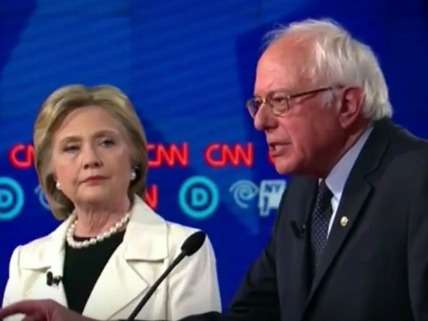Sanders Misleadingly Connects 'Mass Incarceration' to Pot Busts
Clinton minimizes her role in advocating longer sentences and exaggerates her role in trying to shorten them.

During last night's Democratic presidential debate in Brooklyn, Bernie Sanders declared that "we have got to have the guts to rethink the so-called war on drugs." But then he immediately chickened out, saying "too many lives have been destroyed because people possessed marijuana, millions over a 30-year period." That number refers to marijuana possession arrests, which can have lasting social, educational, and occupational consequences but rarely result in substantial time behind bars. Since Sanders' remark about marijuana possession arrests came in the middle of a discussion about "mass incarceration," it was pretty misleading.
The vast majority of incarcerated drug offenders, who represent about half of federal prisoners and 16 percent of state prisoners, were not convicted of marijuana crimes, let alone simple possession. But politicians, even those urging us to "rethink the so-called war on drugs," prefer to talk about pot smokers rather than crack, heroin, and meth dealers. Sanders did a similar bait and switch during last October's debate in Las Vegas, prompting Clinton to say something that was not just misleading but blatantly wrong:
I agree completely with the idea that we have got to stop imprisoning people who use marijuana. Therefore, we need more states, cities, and the federal government to begin to address this so that we don't have this terrible result that Senator Sanders was talking about where we have a huge population in our prisons for nonviolent, low-level offenses that are primarily due to marijuana.
About 300,000 people are serving time for drug offenses in state and federal prisons, which represents one-fifth of the total prison population. But only 15 percent of those drug war prisoners (around 45,000 people) are behind bars because of marijuana offenses, and those offenses typically involve cultivation or distribution. Hence it is clearly not true that prison sentences for "nonviolent, low-level offenses" (which include many property crimes as well as drug offenses) "are primarily due to marijuana," let alone possession of marijuana for personal use. Avowed reformers who pretend otherwise are undermining their own cause.
Still, Sanders deserves credit for being the first major-party candidate in the current election cycle to call for repealing federal marijuana prohibition and the only one to introduce a bill that would do that. Last night he reiterated that "we should take marijuana out of the federal Controlled Substance Act," in sharp contrast with Clinton, who has said only that cannabis should be moved to Schedule II, which would facilitate medical research but would not have any direct impact on arrests.
Last night Clinton did not explicitly mention the war on drugs as a factor in overincarceration, but she did say this about the crime bill:
There were decisions that were made that now we must revisit and we have to correct. I think that sentences got much too long. The original idea was not that we would increase sentences for non-violent low-level offenders, but once the federal government did what it did, states piled on.
"There were decisions that were made" does not quite constitute an apology for her enthusiastic support of putting more people in prison for longer periods of time. Furthermore, the Clinton administration did not merely lead by example: The crime bill offered states money to build more prisons, contingent on passage of "truth in sentencing" laws, which make prison terms longer by restricting or eliminating parole.
Clinton not only minimized her role as a cheerleader for her husband's tough-on-crime policies; she exaggerated her role in the movement to make the criminal justice system less blindly punitive. "The very first speech I gave in this campaign," she said, "was about what I will do to reform the criminal justice system and end…mass incarceration." She was referring to her April 2015 speech at Columbia University, which condemned mass incarceration but did not really explain what she would do about it. In fact, the speech was remarkably vague on that point, although she did eventually endorse some specific sentencing reforms. Sanders has gone farther on that issue as well, calling for the abolition of mandatory minimum sentences.


Show Comments (15)